Top Controversies That Kept Indian Startups On The Edge This Year
Taking cognisance of a spate of corporate misgovernance issues in the last two years, the earlier this year to pave the way for good governance practices at Indian startups.
This much-needed initiative followed a turbulent and largely controversial 2023, which was marked by high-profile governance lapses, spearheaded by names like BYJU’S, BharatPe, and GoMechanic. While we have only scratched the surface here, how can we forget the , and the .
Overall, last year was bogged down in the stories of financial mismanagement by startups, erring founders (think BharatPe’s Ashneer Grover) and other kinds of deception and deceits.
However, as they say: let the past bury its dead; we decided to do just that. Therefore, in spite of lingering onto the past, we decided to compile what new surprises have shaped 2024 so far, all while revealing the cracks that still bring shame to the world’s third-largest startup ecosystem and agony to investors.
What surprised us is that not only did the cases related to revenue misappropriation, forgery, and other similar evils see a sudden death but rather paved the way for new tales to be told.
Be it scalping tickets for high-profile concerts in the country, Indian founders engaging in verbal brawls on social media, or even trysts with investors gone awry, the year 2024 did not lack any flavour of misadventure on any new front. This is only emblematic of the fact that as the Indian startup ecosystem matures, there will be new challenges to overcome with even stronger governance guardrails in place.
With 2025 around the corner, we have yet again compiled a list of controversies that kept Indians gossiping about startup founders throughout the year. With that said, here are the most talked-about startup controversies of 2024. The initiative is part of the 11th edition of Inc42’s annual “Year in Review” series —
MapMyIndia-Investors RowAt the end of November, the controversy surrounding MapmyIndia began when the company announced that its CEO, Rohan Verma, would to focus on launching a new B2C business as a separate entity.
This made investors critical of the terms of the separation, as Verma was to hold a 90% stake in the new venture while MapmyIndia would only retain 10% through a minor investment.
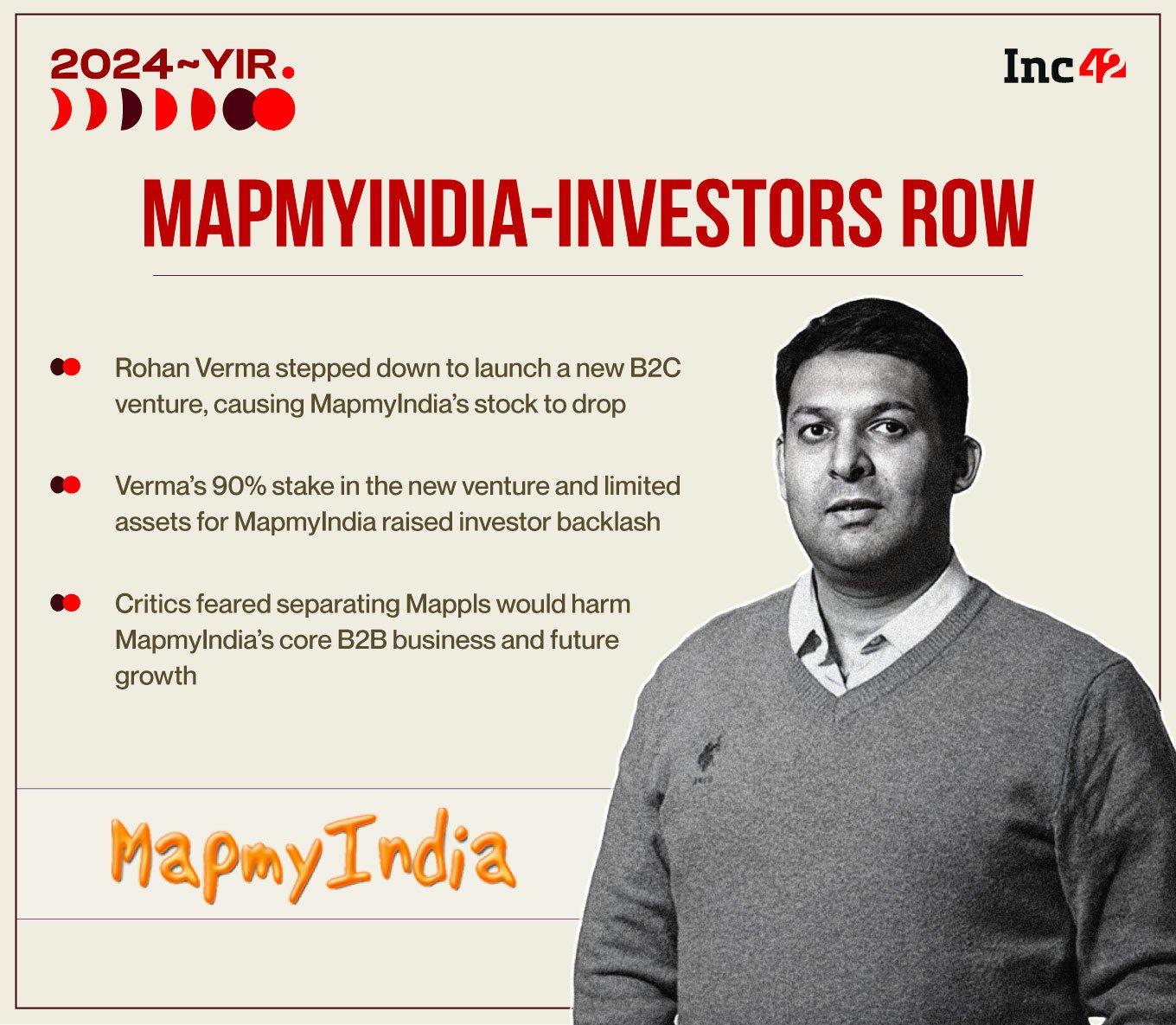
Adding to the concerns, MapmyIndia said that the new venture would inherit key consumer-facing assets, including the Mappls app, while MapmyIndia would only have limited access to anonymised data generated by the app.
Investors and analysts criticised the move, citing the potential diversion of resources from MapmyIndia’s core B2B and B2B2C businesses.
The incident caused MapmyIndia’s share price to plummet to a 52-week low. However, after facing backlash, that he would fund the new venture with his own money, but the dissatisfaction among minority investors persisted.
In November, from the All India Consumer Products Distributors Federation (AICPDF) regarding unsold inventory nearing expiry.
The AICPDF claimed that distributors and retailers were burdened with approximately INR 300 Cr worth of unsold stock, leading to significant financial challenges.

Honasa refuted these allegations, stating that the total inventory in the distribution value chain amounted to INR 40.69 Cr, significantly lower than the AICPDF’s estimate.
This dispute coincided with Honasa’s transition from a super-stockist model to a direct distribution approach, known as Project Neev. The company acknowledged that this strategic shift impacted its financial performance, resulting in a net loss of INR 19 Cr and a 7% decline in operating revenue during the September quarter.
The controversy and financial challenges led to a significant decline in Honasa’s stock price. The stock experienced a sharp drop, .
The legal dispute between became a significant case in the startup ecosystem, showcasing the complexities of shareholder agreements and cross-border legal conflicts.
WestBridge, which invested INR 166 Cr in Shaadi.com in 2006, alleged that the company failed to honour its exit provisions under the Shareholders’ Agreement (SHA).

These provisions included requirements for an IPO, buyback obligations, and drag-along rights.
The case unfolded across multiple jurisdictions, including Indian courts (NCLT, NCLAT, and the Bombay High Court), as well as courts in Singapore. Jurisdictional conflicts arose, as Indian law emphasised the exclusive authority of the NCLT over corporate disputes, while Singapore law permitted arbitration for such matters.
This divergence highlighted the challenges of enforcing international arbitration awards that might conflict with Indian public policy.
WazirX’s $234 Mn Crypto HeistWazirX, once India’s leading crypto exchange, is now at the centre of the
On July 18, 2024, the platform revealed that hackers, allegedly linked to North Korea, had exploited a vulnerability in a multisig wallet hosted on Liminal Custody, modifying its smart contract to siphon funds.
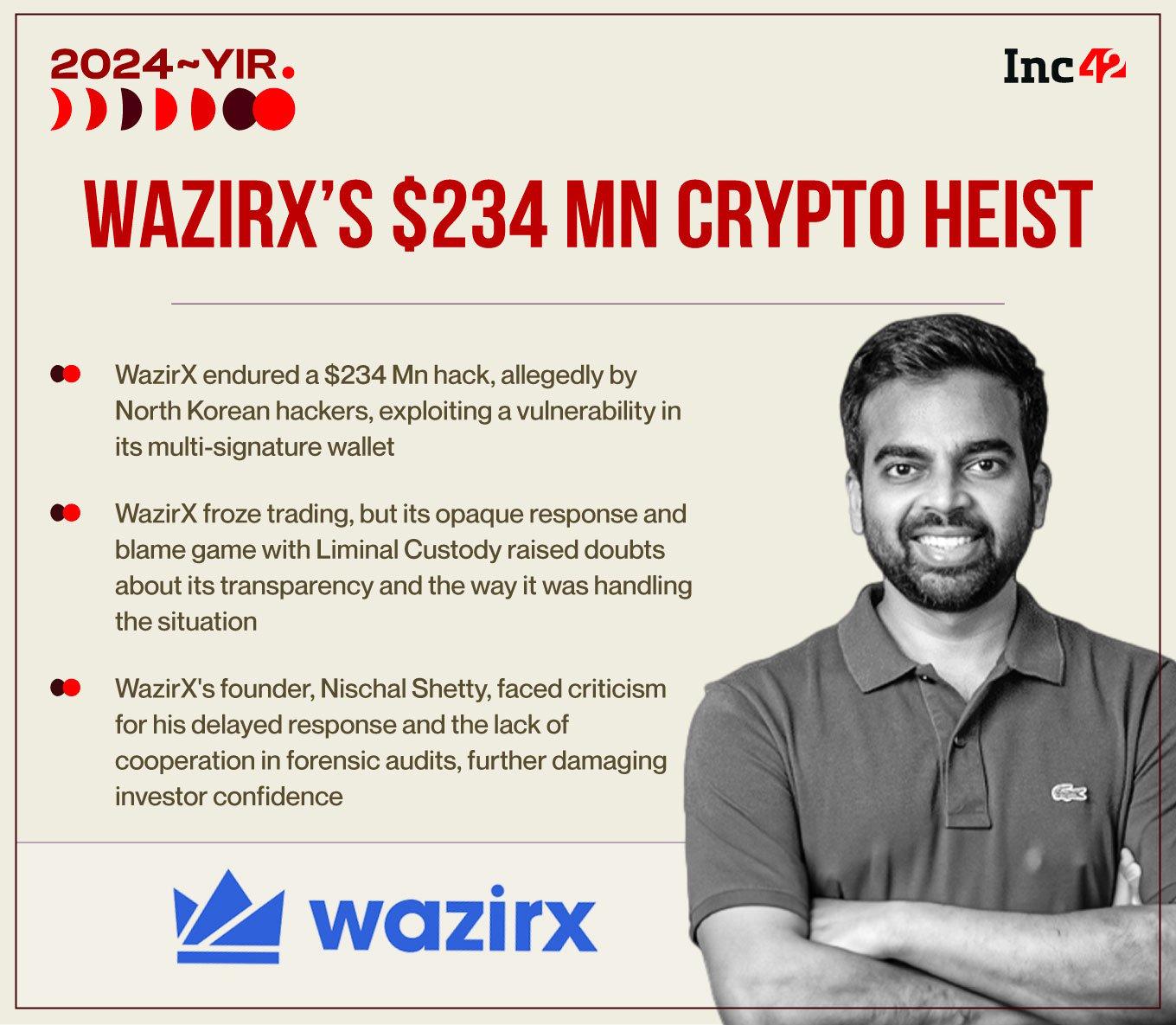
Following the attack, WazirX froze all trading and withdrawals, creating panic among its users. Despite initiating recovery measures, including a white-hat bounty and filing an FIR, critics accused the company of opacity and poor crisis management, leaving investors sceptical about its future.
The hack also sparked a blame game between WazirX and Liminal Custody. While WazirX accused Liminal of interface discrepancies, Liminal claimed WazirX had direct control of five of the six keys required to authorise transactions.
Both companies conducted forensic audits but stopped short of releasing full reports, raising doubts about their claims of innocence. This lack of transparency only added to the scepticism surrounding WazirX’s operations.
As the public face of WazirX, Nischal Shetty faced intense scrutiny. Critics have called out his delayed response to the breach and questioned his decision to avoid a joint forensic audit.
Shetty’s claims of WazirX’s financial stability have been contradicted by independent proof-of-reserve trackers, further undermining investor confidence.
Despite efforts to salvage the platform, including exploring acquisitions and moving assets to new custodians, the situation remains bleak.
BookMyShow Faces Heat Over Coldplay Ticket ScalpingIn September 2024, over allegations of black marketing Coldplay concert tickets. The controversy began when tickets for Coldplay’s Mumbai concerts, scheduled for January 2025, got sold out within minutes of their release on September 22.
Shortly after, tickets appeared on secondary platforms at inflated prices, some reaching up to INR 3 Lakh, prompting widespread public outrage.

In response to these allegations, , Ashish Hemrajani, and the technical head of its parent company, Big Tree Entertainment Private Limited, to provide statements regarding the alleged black-marketing activities.
BookMyShow condemned the practice of ticket scalping. The company filed a complaint with the police and pledged full cooperation with the investigation.
Additionally, BookMyShow warned fans against purchasing tickets from unauthorised sources, as these could be counterfeit.
BYJU’S Operational CrisisIn 2024, BYJU’S faced a severe decline in its .
By October, its founder Byju Raveendran admitted that , a far cry from its peak valuation of $22 Bn in 2022.
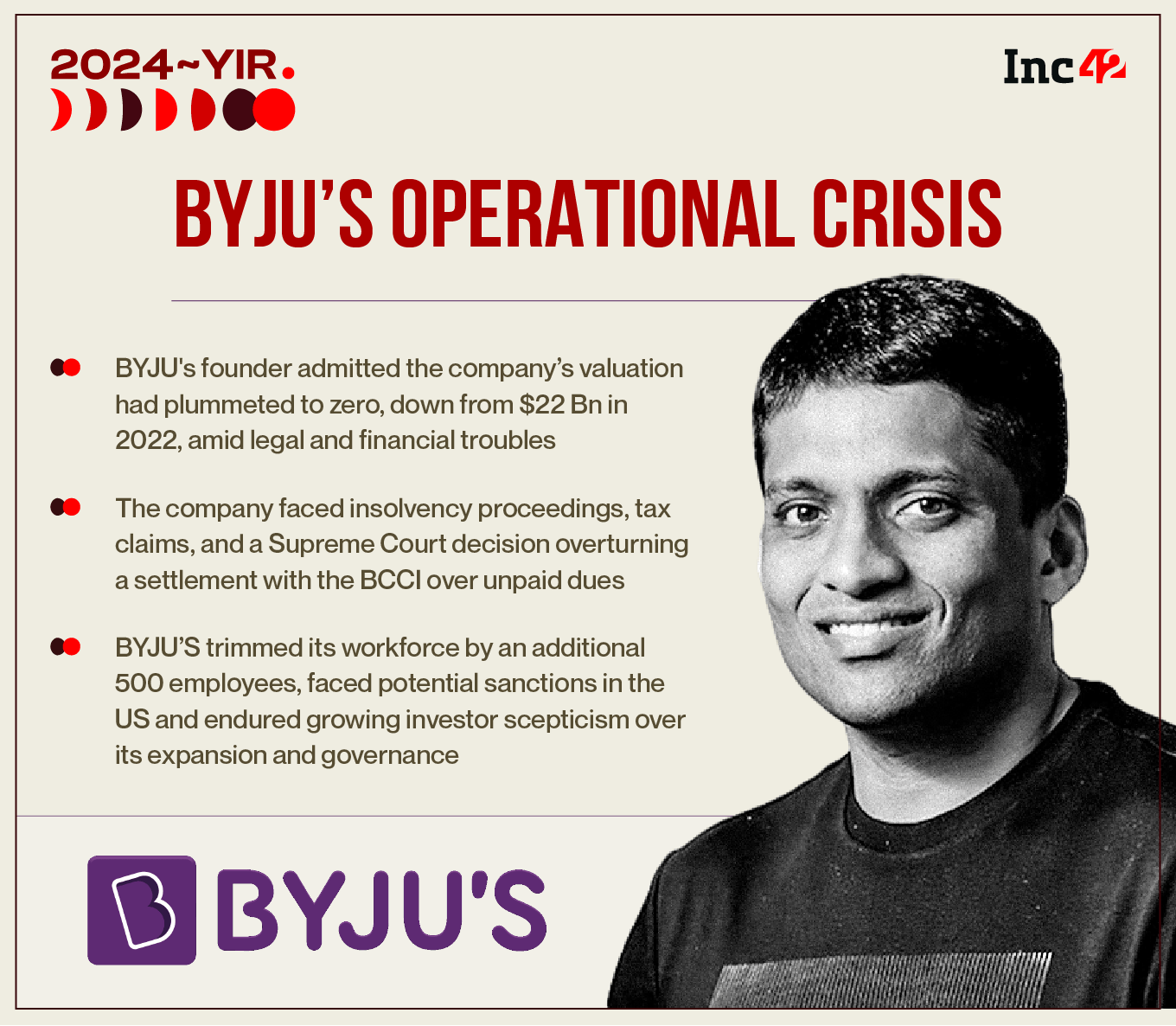
The company was embroiled in legal battles, including insolvency proceedings. In August, the , following accusations of .
Additionally, as part of the ongoing insolvency process.
In a related matter, the regarding unpaid sponsorship dues, further complicating its financial obligations.
Amid these challenges, the company continued to struggle with operational issues, laying off approximately 500 employees in April as part of cost-cutting efforts. Furthermore, in December 2024, a US federal judge considered imposing sanctions on BYJU’S executives for allegedly stripping assets from subsidiaries.
These events, compounded by growing investor scepticism and criticisms of its rapid expansion and corporate governance, marked a difficult year for the once high-flying edtech giant.
Regulatory Albatross Around Paytm’s NeckIn 2024, Paytm faced significant regulatory and operational challenges. On January 31, the to stop accepting new deposits and conducting credit transactions after February 29, 2024, citing “persistent non-compliance” with regulatory norms.
This action threatened Paytm’s business model and led to a substantial decline in its market valuation.
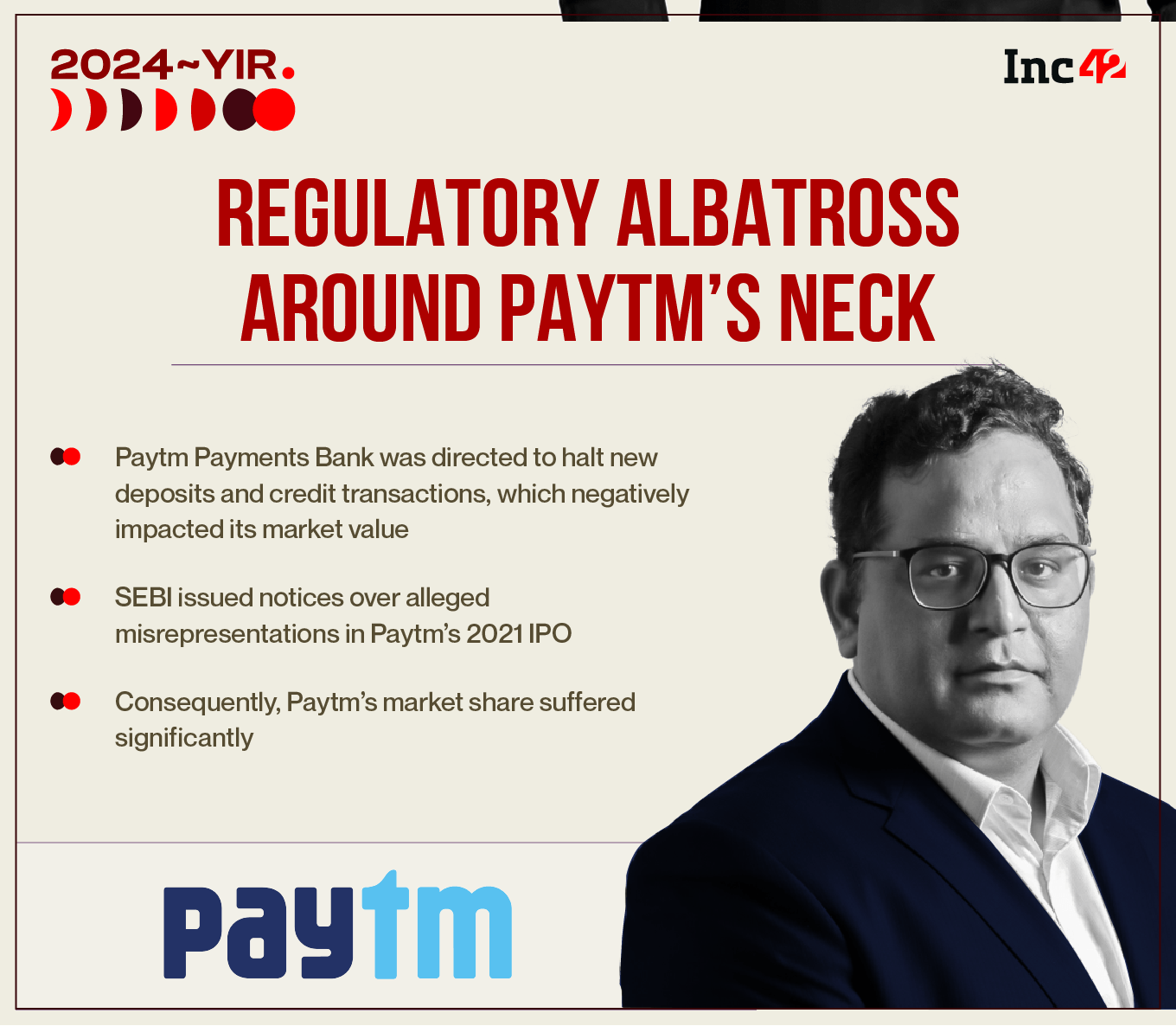
In August, and other board members. The notices pertained to alleged misrepresentations during Paytm’s November 2021 IPO, including concerns over Sharma’s classification as a public shareholder and ESOPs to large shareholders.
The company management also faced scrutiny by the Bengaluru labour commission after .
Throughout the year, Paytm’s digital payments market share continued to decline, with competitors like Google Pay and Walmart’s PhonePe gaining ground. This erosion was attributed to regulatory challenges and intensified competition in the digital payments sector.
In October, CEO Sharma faced backlash for a controversial social media post regarding the passing of industrialist Ratan Tata. The post was perceived as insensitive, leading to public criticism and an official apology from Paytm.
Ola Electric made history in 2024 by becoming the first EV company to go public in India, marking a milestone year for the company. However, for its outspoken CEO Bhavish Aggarwal, the year brought a string of controversies that cost the brand its reputation, to say the least.
Earlier in the year, , who criticised the company’s subpar services. Kamra posted about neglected e-scooters outside an Ola showroom, which led to a flood of complaints from other users.
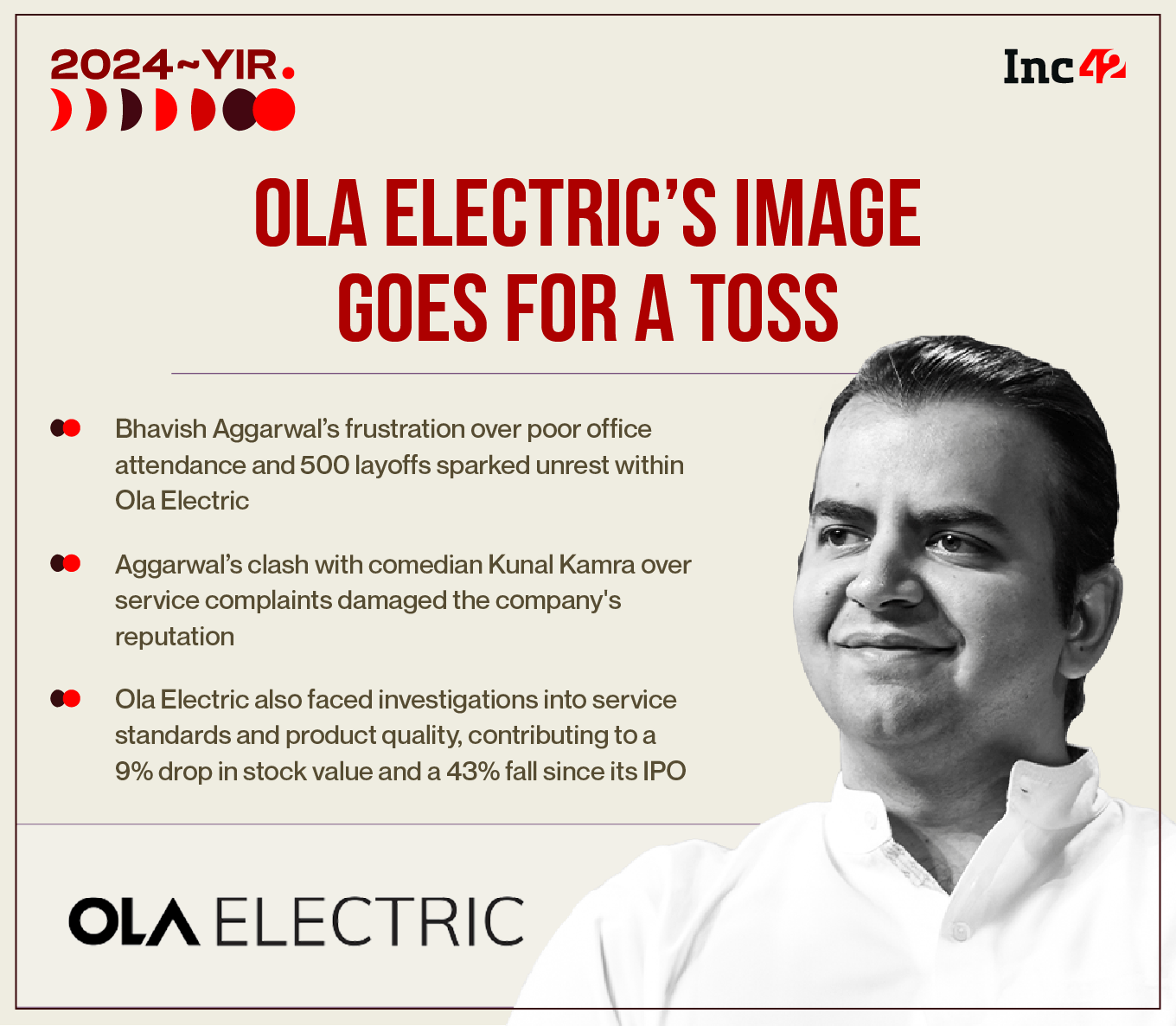
In response, Aggarwal emphasised the company’s efforts to expand service centres, but this public spat garnered widespread attention and negative sentiment toward Ola Electric.
The company also when the Central Consumer Protection Authority (CCPA) launched an investigation into Ola Electric’s service standards and product quality, following over 10,000 consumer complaints.
Indian regulatory authorities began an inquiry into the company’s operations, with Aggarwal attributing most complaints to minor issues like loose parts or user errors.
In addition, in a public dispute with Linkedin, Aggarwal announced that his companies would and migrate to Krutrim’s cloud. This came after Microsoft-owned LinkedIn removed one of his posts on the platform.
In December, Aggarwal addressed employees regarding poor office attendance, if attendance didn’t improve. This has come on the heels of significant layoffs earlier this year, with as part of efforts to streamline operations.
Legal Abyss Deepens For Rahul YadavAlready down a grim controversial path, the former CEO of Housing.com, Rahul Yadav, continued to sink deeper into the legal quagmire in 2024.
The 2024 bucket of troubles began for 4B Networks (also known as Broker Network) when the NCLT initiated the Corporate Insolvency Resolution Process (CIRP) in January.
The bankruptcy proceedings came at the behest of a petition filed by NBFC Krishkan Investment Private Limited regarding an unresolved debt of INR 1.2 Cr.
The bankruptcy proceedings weren’t the only stressors for Yadav this year. At the end of 2024, Yadav’s 4B Network saw a from its key investor Info Edge. Not unlike the previous year’s spats between Yadav and Info Edge’s head Sanjeev Bikhchandani, this time also the latter accused the former of fraudulent activities related to the misuse of funds.
The case against Yadav also involved other individuals linked to the company, including his wife and business partners, and included allegations of a broader scheme of financial mismanagement and fraud.
In addition, separate FIRs were filed by vendors like Interspace Communications, who claimed to have been defrauded of INR 10 Cr by 4B Networks.
The post appeared first on .